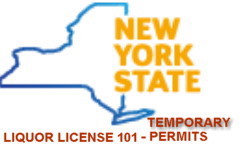There are important things to consider before applying for a temporary retail permit issued by the New York State Liquor Authority (SLA). A permit can get your business up and running quickly, but there are pros and cons, and many rules.
DOES your business qualify?
Not every business qualifies for a 90-day temporary retail permit. These permits are sometimes referred to as “STs.” We don’t know why it is called that, but we thought we’d mention it in case licensing or a member of our team uses that insider jargon.
Any business outside of New York City can get a 90-day temporary permit if a) they pay a fee ranging from $64 for grocery store beer or $640 for an on-premise license of any kind. However, to get the permit, you must have a full application with the fee paid on file, as well. In other words, you cannot apply for a temporary permit and then file an application for the license later.
NYC rules are different
In New York City, you cannot get a temporary retail permit for any business unless your corporation or LLC is taking over a premise with a license and you have executed an asset purchase agreement with the current tenant/licensee. The seller’s business must have been open and operating for the 30 days before the SLA received your transfer application and temporary retail permit application. For this reason, it is very important that the seller’s license remains in use by the seller until your temporary permit is conditionally approved.
NEW liquor stores don’t qualfiy
Applicants can only get a temporary retail permit for an existing liquor store location, provided that the applicant’s entity is in contract with the seller’s licensed entity. New liquor store locations require a public hearing and do not qualify for a temporary permit.
ARE temporary permits a good idea?
We personally recommend that applicants not apply for a temporary retail permit unless the deal is good and time is of the essence. Here’s why:
1. Temporary permits are approved subject to the applicant submitting proof that they have a right to the premise. This means that you will have to provide a new lease or a lease assignment in your entity name. If you are in contract to buy the assets of a business, you cannot get this until you close on the purchase. Consummating a big-bucks deal is dangerous. What happens if you pay off the seller and get the keys and lease assignment so that you can take over the space, only to learn later that your business partner had a statutory disqualification (like a felony conviction) that he didn’t tell you about? In cases like that, the SLA would yank the temporary permit and disapprove your application. We have seen this happen.
2. Temporary permits are like probationary licenses. If the SLA receives a police referral about staying open past approved hours or a sale to a minor, you’ll lose the permit without due process and the permanent license application will be disapproved. We have seen it happen. Clients were shut down for 60-90 days with no notice and it cost them several thousand dollars to hire us to make things right with the authority.
3. Applicants operating on temporary permits cannot get credit terms with wholesalers. They have to pay cash or check upon delivery of product.
A few other things you should know about temporary retail permits:
– Grocery store beer permits cost $64. If also selling wine products (low alcohol wine) along with beer, the fee is $128 for grocery stores.
– Bars, restaurants and liquor stores pay $640 for the permit.
– The permit is good for 90 days. It can be extended for an additional fee ($96 for on-premise and liquor store applicants, less for grocery stores).
THE takeaways
– Not every location or business type qualifies;
– A full application must be on file to get a temporary permit;
– Think of temporary retail permits as probationary licenses. They can be yanked by the SLA even if you did nothing wrong.
– Seller’s push temporary permits because they want a quick closing. Think long and hard about whether operating under a temporary retail permit is needed or desirable.
If you have any questions, don’t hesitate to contact us.
– John Springer, My Liquor License Guy
